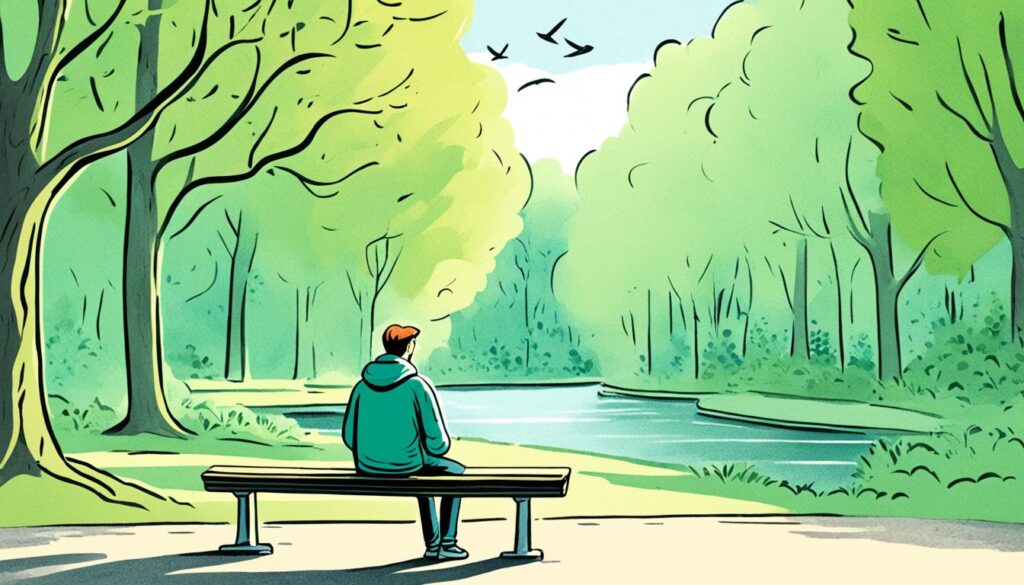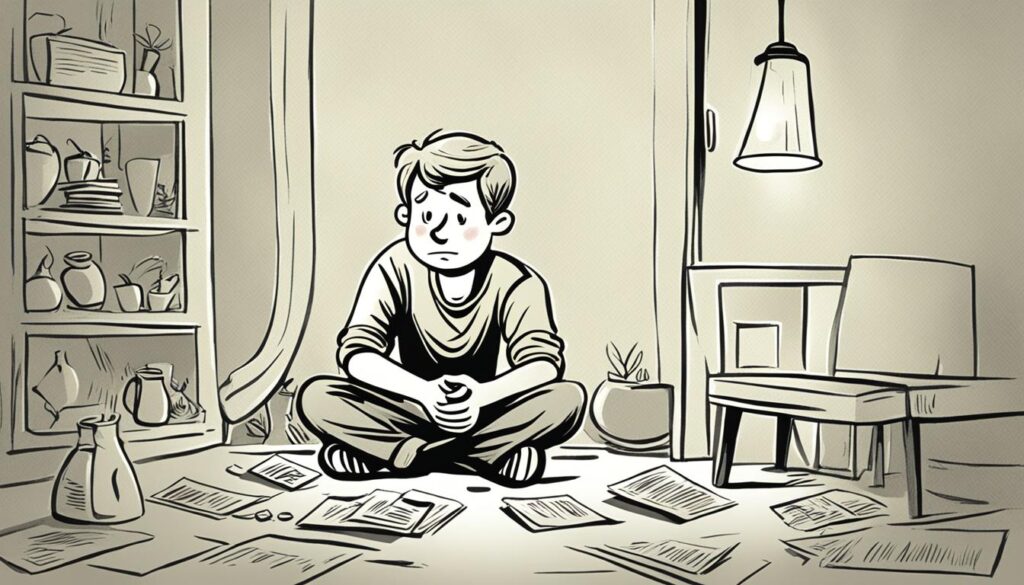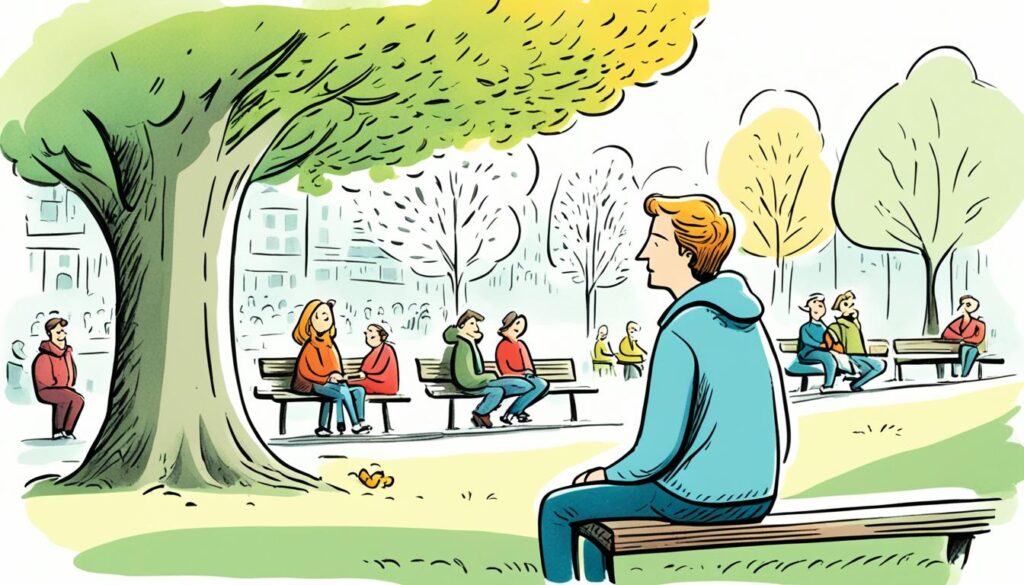Are introverts truly happier alone? It’s a common belief that introverts prefer solitude and find their happiness in being alone, but is this really the case? Contrary to popular belief, introversion is not synonymous with loneliness or isolation. In fact, introverts derive happiness from a myriad of sources, including deep relationships, self-reflection, and pursuing their passions. In this article, we will debunk the myth that introverts are happier alone and explore seven compelling reasons why.
Key Takeaways:
- Introverts derive happiness from a variety of sources, including meaningful relationships, self-reflection, and pursuing their passions.
- They value deep connections over surface-level interactions.
- Time alone allows introverts to recharge, reflect, and find mental clarity.
- Introverts have a rich inner world and find joy in creative endeavors.
- Quality relationships are essential for introverts’ well-being.
7 Reasons Why Introverts are NOT Happier Alone
Contrary to popular belief, introverts find happiness in a variety of sources that extend beyond solitude. While they do value their alone time, it is not the sole factor contributing to their well-being and contentment. Here are seven reasons why introverts thrive when they are not alone:
The Myth of the Lone Wolf
Introverts are often wrongly associated with being loners or reclusive individuals who avoid social interactions. However, introverts simply have a different preference when it comes to social energy. They need time alone to recharge and regain energy after social interactions. Being introverted does not mean having a complete aversion to social connections. Introverts can enjoy social interactions, but they also require ample alone time for their mental and emotional well-being.

| Myth | Reality |
|---|---|
| Introverts are loners | Introverts enjoy social connections but also need alone time |
| Introverts avoid social interactions | Introverts value quality social interactions |
| Introverts don’t like being around people | Introverts appreciate personal space and recharge through solitude |
Contrary to popular belief, introverts are not opposed to social interactions. They simply have different needs when it comes to socializing. While extroverts thrive on constant social stimulation, introverts find solace and recharge in moments of solitude. This alone time allows them to reflect, process their thoughts and emotions, and regain their energy for future social interactions.
It’s important to understand and respect the introvert’s need for solitude. It doesn’t indicate a lack of interest in socializing or a dislike for others. Introverts can still enjoy social interactions, but they also require sufficient alone time to maintain their mental and emotional well-being.
Craving Connection, Just in Moderation
Introverts are often misunderstood as individuals who do not value social interaction. However, the truth is that introverts do crave connection and meaningful relationships, albeit in moderation and on their own terms.
Unlike extroverts who thrive on constant social interaction, introverts can feel drained and overwhelmed by excessive stimulation. At the end of the day, introverts seek solace in their own company and often require a lot of time alone to recharge and find balance.
Contrary to popular belief, introverts are not antisocial or isolated individuals. They simply prefer quality over quantity when it comes to social interactions. Spending time with a close circle of friends, engaging in deep conversations, or immersing themselves in solitary pursuits are sources of stimulation and fulfillment for introverts.
For example, imagine an introvert enjoying a quiet evening at a coffee shop, engrossed in a good book or art. They find immense satisfaction in these solitary pursuits, which provide the mental and emotional stimulation they desire.
Through this selective approach to socializing and engagement, introverts strike a balance between their need for connection and their need for personal space. It is in this balance that introverts find happiness and a sense of inner fulfillment.
| Introvert’s Perspective | Extrovert’s Perspective |
|---|---|
| Enjoys spending time alone | Drawn to socializing and being around others |
| Values quiet moments and reflection | Thrives in lively and busy environments |
| Craves meaningful connections | Finds happiness in a wide social circle |
| Seeking personal growth through self-reflection | Seeking personal growth through external interactions |
| Finds fulfillment in solitary pursuits | Finds fulfillment in social activities |
The key for introverts is knowing their own limits and honoring their need for solitude while still valuing social connections. By understanding and embracing their introverted nature, introverts can find happiness and contentment in a world that may often prioritize extroversion.
Solitude Doesn’t Equal Happiness
Solitude is an essential element for introverts to recharge and find balance, but it is important to understand that it does not equate to happiness in isolation. Introverts value their personal space and time alone to reflect, gather their thoughts, and recharge their energy. However, true happiness for introverts lies in finding a balance between solitude and social interactions.
While introverts may enjoy spending time alone with a good book or engaging in solitary activities that bring them joy, they also have a need for meaningful connections and social interaction. After all, humans are social beings, including introverts. It is in these moments of connection and engagement that introverts find fulfillment and happiness.
Introverts may often find small talk and shallow conversations exhausting or unfulfilling. They prefer engaging in meaningful conversations that delve into deeper topics and allow for a genuine connection. Rather than spending hours on social media or engaging in small talk, introverts find happiness in quality interactions that stimulate their minds and emotions.

Imagine sitting in a quiet corner of a coffee shop, engrossed in a stimulating conversation with a close friend. The warmth of the atmosphere, the laughter shared, and the connection formed all contribute to the introvert’s sense of happiness and well-being. Social interactions that provide genuine connection and depth can be energizing and fulfilling for introverts.
To illustrate this concept further, let’s consider a hypothetical scenario. Sarah, an introverted individual, enjoys spending a Saturday afternoon in the park, reading a book under a tree. She cherishes the peace and solitude that comes with being alone and fully absorbed in the pages of her favorite author. However, Sarah also values the occasional interruption by a passerby who stops to admire the book she’s reading and strikes up a conversation about their shared love for literature. These brief social interactions enhance Sarah’s overall happiness by adding a layer of connection and shared passion to her solitary experience.
It’s important to note that introverts can experience happiness in solitude, but it is not the only source of their well-being. Balancing personal space and meaningful social interactions is key to their overall happiness and contentment.
The Importance of Quality Relationships
Introverts find happiness in fostering deep, genuine connections rather than having a large social circle. For them, variety is indeed the spice of life, but in a more intimate and meaningful way. Instead of seeking constant social interaction, introverts value quality over quantity when it comes to relationships.
Having a few close friends whom they can trust and rely on is essential for an introvert’s well-being. These quality relationships provide emotional support, understanding, and a sense of belonging. Introverts thrive when they can share their thoughts, feelings, and experiences with people who truly understand them.
Think of it this way: introverts recharge their energy through introspection and solo activities, but they need the social interaction to pour out the energy. These relationships serve as a safe space for introverts to express themselves without judgment or pressure to conform to extroverted norms.
| Benefits of Quality Relationships for Introverts | Examples |
|---|---|
| Emotional Support | Having a friend to lean on during tough times or share exciting news with. |
| Understanding | A partner who understands their need for alone time and supports their introverted tendencies. |
| Shared Interests | Having a friend who shares their passion for a specific hobby or activity, allowing them to engage in it together. |
| Acceptance | A friend who appreciates them for who they are, including their introverted nature. |
| Authenticity | A relationship that encourages them to be their true selves, without needing to put on an extroverted facade. |
While introverts may need some alone time to recharge and reflect, they also recognize the significance of social connections in their lives. Introverts cherish the moments shared with their close friends, and these relationships bring them happiness, fulfillment, and a sense of belonging.
So, it’s not that introverts don’t appreciate social interaction or variety in life. It’s simply that they find happiness in deeper, more meaningful relationships that align with their introverted nature.
Recharging, Not Isolation
Introverts have unique tendencies that require them to recharge their energy levels and find solace in their alone time. Contrary to the misconception that introverts prefer isolation, they need this time to process their thoughts, emotions, and experiences.
Recharging is an essential practice for introverts as it allows them to reset, regain focus, and maintain their mental well-being. When introverts engage in activities that align with their interests and passions, they experience a sense of fulfillment and contentment.
| Introverted Tendencies | Benefits of Being Alone |
|---|---|
| Introverts recharge their energy levels through alone time. | They reflect and ponder over their past, present, and future to drive wisdom. |
| Alone time allows introverts to process their thoughts, emotions, and experiences. | Recharging helps introverts regain focus and maintain mental well-being. |
| Engaging in activities aligned with their interests brings introverts fulfillment. | Introverts find solace and clarity in their moments of solitude. |
It’s important to note that introverts’ need for downtime and recharging is not about isolating themselves from others. Rather, it’s about understanding and honoring their introverted tendencies and recognizing the benefits of being alone. By embracing their need for alone time, introverts are able to lead balanced and fulfilling lives.

Variety is the Spice of Life
Introverts find happiness in a variety of activities, including solitary pursuits, hobbies, and creative endeavors. Engaging in activities that align with their interests and passions brings them joy and fulfillment. While introverts may enjoy spending time alone, it is not the sole source of their happiness. In fact, introverts thrive on a balance between stimulating activities and downtime. This combination allows them to satisfy their need for introspection and reflection while still enjoying the benefits of social interaction.
For introverts, solitary pursuits such as painting, writing, or playing a musical instrument provide a sense of inner fulfillment and creative expression. These activities allow them to explore their thoughts and ideas, fostering personal growth and self-discovery. Engaging in hobbies like gardening, cooking, or photography also brings introverts a sense of satisfaction and accomplishment.
It’s important for introverts to find a balance between stimulating activities and downtime. Downtime serves as an opportunity for introverts to recharge their mental and emotional energy, which is essential for their overall well-being. Whether it’s reading a good book, taking a relaxing walk in nature, or simply enjoying a moment of quiet reflection, introverts find solace and contentment in these moments of solitude.
| Stimulating Activities | Downtime |
|---|---|
| Engaging in hobbies | Reading a book |
| Exploring creative endeavors | Taking a nature walk |
| Embracing solitary pursuits | Engaging in quiet reflection |
The key to maintaining introvert mental health lies in finding the right balance between stimulation and downtime. Too much stimulation can lead to overwhelm and exhaustion, while too much downtime can result in isolation and stagnation. By incorporating a variety of activities into their lives, introverts can create a well-rounded and fulfilling lifestyle that promotes their overall well-being.
Social Beings at the Core
Contrary to the common belief that introverts are unsociable, they are social beings just like extroverts. However, introverts have their unique way of appreciating and benefiting from social interactions.
Introverts may prefer more intimate settings and deeper conversations rather than large social gatherings. They value introspection and self-awareness, finding happiness in engaging with others on a meaningful level.
While extroverts thrive in external stimulation and constant socializing, introverts find fulfillment in quieter moments and introspective conversations. They enjoy one-on-one interactions that allow them to connect deeply and have more meaningful experiences.
Introverts understand the benefits of being alone and value the opportunity for self-reflection. They find solace in their own company and appreciate the personal growth that comes from introspection and introspective conversations with others.
By embracing their introverted nature and understanding their need for meaningful connections, introverts exemplify the rich tapestry of human social behavior. They remind us that everyone has their unique way of finding happiness and fulfillment, whether by being alone or engaging with others.

Throughout history, famous introverts like Albert Einstein, Rosa Parks, and Emily Dickinson have made significant contributions to society while valuing their alone time and introspection.
| Benefits of Being Alone | Examples |
|---|---|
| Enhanced self-awareness | Introverts like Frida Kahlo and Carl Jung used their alone time to delve into their inner selves and explore their thoughts and emotions. |
| Improved creativity | Introverts like J.K. Rowling and Steven Spielberg found inspiration in their solitude, allowing them to create extraordinary works of art. |
| Deeper connections | Introverts like Mahatma Gandhi and Eleanor Roosevelt utilized their introspective nature to form strong connections and lead social change. |
So, while introverts may have a different approach to social interactions, they are social beings at their core, finding happiness and fulfillment in their own unique way.
5 Reasons Why Some Introverts May Come Across as They Like to Be Alone
Do introverts truly find happiness in solitude, or is the belief that they prefer to be alone simply a misconception? Contrary to popular belief, introverts are not necessarily happier when they are alone. In fact, there are several reasons why introverts thrive in social settings and derive joy from meaningful connections. Let’s explore why introverts are not happier alone and uncover the real sources of introvert contentment.
The Art of Selective Socialization
Introverts have a unique approach to social interaction, preferring quality over quantity when it comes to their social connections. Rather than engaging in large group activities, introverts choose to spend time with a select few close friends who truly understand and appreciate them. They prioritize meaningful conversations and deep connections over small talk and superficial interactions.
For introverts, selective socialization is not a reflection of a preference for being alone. Instead, it is an expression of their introvert nature and their need for genuine and intimate connections. By surrounding themselves with individuals who value and respect their need for solitude, introverts can find joy and fulfillment in their social interactions, knowing that their personal boundaries are respected.

| Introverts | Extroverts |
|---|---|
| Prefer quality over quantity in social connections | Enjoy a larger social circle and thrive in group settings |
| Value meaningful conversations and deep connections | Engage in small talk and enjoy casual interactions |
| Find joy and fulfillment in intimate social settings | Feel energized by socializing with a large number of people |
By being selective about their social interactions, introverts can create a supportive and nurturing social circle that aligns with their unique needs and preferences. This approach allows them to fully engage in meaningful conversations, cultivate deep connections, and find happiness in their own company while enjoying the company of others.
Rechargeable Batteries Need Downtime
Introverts require downtime to recharge their energy levels and regain their mental and emotional balance.
In a world that values constant social interaction and extroversion, it’s important to recognize the unique needs of introverts. While extroverts often thrive in social settings and gain energy from being around others, introverts recharge their batteries through moments of solitude and downtime. This essential aspect of introversion allows them to regain their mental and emotional equilibrium, ensuring they have the energy for social interactions and other activities.
But what does this downtime entail for introverts? It’s not about avoiding people or being antisocial, but rather honoring their need for quiet moments of solitude. During these times, introverts can process their thoughts, emotions, and experiences, gaining clarity and insight. It’s a time for self-reflection, introspection, and rejuvenation.
| Introverts | Extroverts |
|---|---|
| Recharge through downtime and solitude | Recharge through social interaction and external stimulation |
| Process thoughts, emotions, and experiences | Process thoughts and emotions through external processing and interaction |
| Find clarity and regain mental and emotional balance | Replenish energy through social engagement and external stimuli |
Imagine introverts as rechargeable batteries that need downtime to function optimally. Just like you recharge your smartphone overnight to ensure it has enough power for the next day, introverts need dedicated moments of solitude to recharge their energy levels. Without this essential downtime, introverts may feel overwhelmed, drained, and unable to fully engage in social interactions.
So, the next time you notice an introvert seeking some alone time, remember that it’s not a sign of anti-social behavior or a lack of interest in others. It’s a necessary self-care practice that allows introverts to honor their unique needs, recharge their batteries, and bring their best selves to the world.
Quiet Moments, Not Lonely Moments
Solitude is a choice for introverts that brings them peace, clarity, and personal growth. While some may mistake introverts’ preference for quiet moments alone as loneliness, it is important to understand the distinction between the two.
Loneliness is a feeling of disconnection and isolation that can affect both introverts and extroverts. It is a sense of longing for meaningful connections and a lack of fulfillment in social interactions. However, introverts find solace and contentment in their quiet moments alone without experiencing the loneliness that others may perceive.
For introverts, these quiet moments provide an opportunity for introspection, self-reflection, and recharge. It is a time for them to process their thoughts, emotions, and experiences, leading to mental clarity and personal growth. While being alone, introverts can find the clarity they need to navigate their inner world and gain a deeper understanding of themselves.
Embracing these quiet moments does not mean introverts are avoiding social interactions or isolating themselves from others. It is simply a part of their introvert personality traits and a way for them to replenish their energy and find balance in their lives. Introverts value their alone time as it allows them to recharge and be fully present in social situations when they do engage with others.
Ultimately, introverts find happiness and fulfillment in their own company, appreciating the clarity and personal growth that quiet moments bring. While solitude may not be for everyone, for introverts, it is a source of strength and an essential component of their well-being.

Thinking Before Speaking
Introverts have a unique approach to communication. They tend to prioritize introspection and careful consideration of their words. This thoughtful approach allows introverts to express themselves authentically and meaningfully. Unlike extroverts who may speak more spontaneously, introverts prefer to think before speaking.
One of the reasons introverts value thinking before speaking is their appreciation for personal space. They thrive when they have the mental and physical room to process their thoughts and emotions. Overly stimulating or fast-paced social environments can be overwhelming for introverts, making them retreat into their own thoughts.
By taking the time to think before speaking, introverts ensure that their words align with their inner reflections. They value the depth and substance of conversation, often engaging in meaningful discussions rather than participating in small talk. This deliberate approach to communication is a hallmark of introversion and contributes to their overall well-being.
Throughout history, many introverts have made significant contributions to society through their thoughtful and introspective nature. Think of renowned philosophers like Socrates and Descartes or introspective writers such as Virginia Woolf and Henry David Thoreau. These individuals embraced the power of introspection and used it to shape their ideas and perspectives.
“The greatest minds are capable of the greatest vices as well as of the greatest virtues.” – René Descartes
Personal space and introspection are essential elements for introverts to maintain their mental and emotional equilibrium. By valuing thoughtfulness and introspection, introverts empower themselves to navigate social interactions with authenticity and contribute their unique insights to the world.
| Introverts | Thinking Before Speaking |
|---|---|
| Prefers personal space | Allows for introspection |
| Thoughtful approach to communication | Ensures authenticity |
| Value depth in conversations | Avoids small talk |
| Contributes unique insights to society | Shapes ideas and perspectives |
Savoring Solitude in Small Doses
Introverts value solitude and recognize its rejuvenating effects on their well-being. However, they also understand the importance of maintaining a balance in their social interactions. While introverts thrive in moments of solitude, excessive isolation can lead to feelings of loneliness and disconnectedness. To avoid this, introverts savor solitude in small doses.
For introverts, solitude is a valuable tool for self-reflection, recharging, and personal growth. It provides them with the opportunity to dive deep into their thoughts, gain clarity, and cultivate a better understanding of themselves. By taking the time to be alone, introverts can recharge their energy and restore their mental and emotional balance.
However, introverts also cherish meaningful social connections. They know the value of maintaining relationships and engaging in social interactions. While introverts may prefer smaller, more intimate gatherings or one-on-one conversations, they still appreciate the richness that comes from connecting with others. By savoring solitude in small doses, introverts can strike a harmonious balance between enjoying their personal space and nurturing their social connections.
Imagine an introvert who spends a Sunday afternoon in a cozy coffee shop, enjoying a good book and sipping on their favorite brew. The peaceful atmosphere provides them with the ideal environment for introspection and rejuvenation. Afterward, they meet up with a close friend for dinner, engaging in a deep and meaningful conversation that leaves them feeling energized and fulfilled. This combination of solitude and social connection allows introverts to thrive and find happiness.
FAQ
Are introverts happier alone?
No, introverts derive happiness from a variety of sources, including quality relationships, self-reflection, and pursuing their passions.
What are the benefits of solitude for introverts?
Solitude allows introverts to recharge, find mental clarity, and pursue activities that bring them joy and satisfaction.
What are some strengths of introverts?
Introverts excel in deep and meaningful relationships, self-reflection, creativity, and introspection.
How do introverts spend their alone time?
Introverts use their alone time to recharge, engage in solitary pursuits, reflect on their thoughts and emotions, and pursue their interests.
How do introverts practice self-care?
Introverts practice self-care by honoring their need for alone time, engaging in activities they enjoy, and fostering meaningful connections.
What is the impact of alone time on introverts’ mental health?
Alone time allows introverts to process their thoughts and emotions, find clarity, and maintain their mental well-being.
Are introverts happier when alone or when socializing?
Introverts find happiness in balancing alone time with social interactions. They appreciate quality connections and meaningful conversations.
How do introverts find happiness in relationships?
Introverts value deep and genuine connections. Having a few close friends whom they can trust and rely on brings them happiness.
Why do introverts need alone time?
Introverts need alone time to recharge their energy levels, process their thoughts and emotions, and find mental and emotional balance.
How do introverts find stimulation and contentment?
Introverts find stimulation and contentment through activities that align with their interests, hobbies, and creative pursuits.